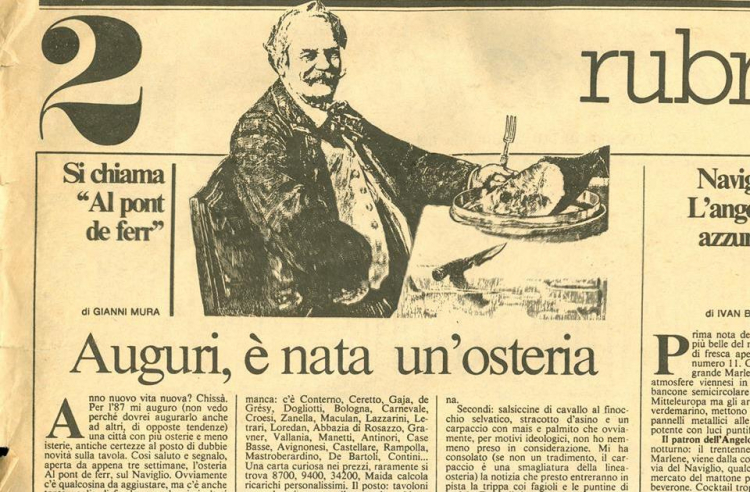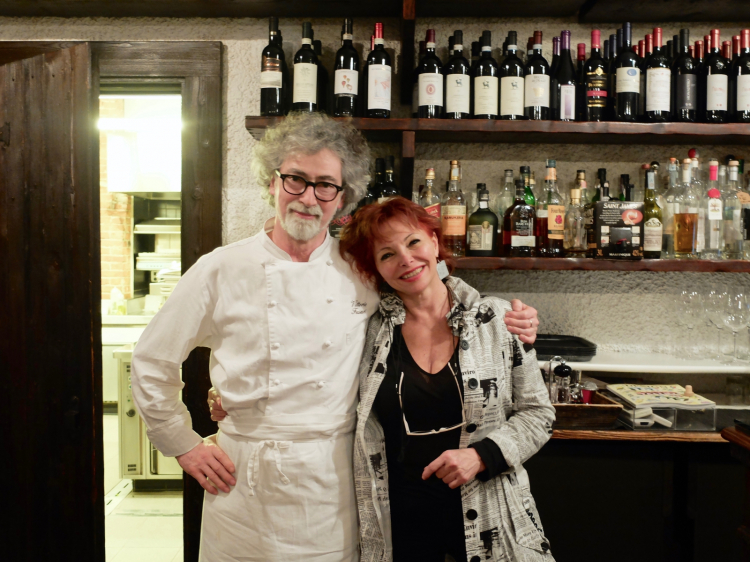Vittorio Fusari says it was very hard at first: «More than that: a nightmare. I arrived in Milan when Expo was about to begin. I was disoriented: I had to reinvent the cuisine at Al Pont de Ferr, move from spherification to product, to use a catchphrase. I had to build a brigade, the more experienced guys had left with Perdomo». Expo was an avalanche: the restaurant was always full, the expectations were high at the most difficult stage, when the team changes: «Truth is, for six months I suffered a lot». Patron Maida Mercuri nods beside him: «Let’s say some dishes really didn’t work [she uses a more tranchant expression, “they were pitiful”]».
She had called Fusari a few months earlier, «it was late in 2014, Matias was leaving and I thought I needed someone who would guarantee a great product knowledge. I wanted to interrupt a journey and start a new one». He says: «When she called me, I thought it was to ask for advise, so that I could find a young chef she could give value to. I was, and still are, a man from Franciacorta. My wife and children live there. I had nothing to share with Milan».

An article from 1987 by Gianni Mura for Repubblica presents the new born Pont de Ferr. The restaurant turned 30 last year
After all, the chef and the Lombard metropolis had never been very close: «let’s say I didn’t like it at all: too many separate entities». He had worked here in the Eighties, first in a cafè in Piazza Mirabello, then for three months in Via Bonvesin della Riva, at
Gualtiero Marchesi’s, «I remember there were
Davide Oldani and
Carlo Cracco, very young. When I had a chance, I would dine at
Pina’s
Scaletta [
Pina Bellini, she opened
Scaletta in 1977] » in Porta Genova.
Fusari’s heart was beating then, and still does, for a less trendy style than that of Perdomo, «to me, restaurants are something else». Mercuri: «I remembered Fusari from Maschere [a restaurant by Lake Iseo where he received a star. It was a craveable destination from 1987 to 1995], he went against the trend with his well-researched cuisine», but connected with products, territory. Could this work on the Milanese Navigli well into the new millennium, full of alcoholic tourists and sad happy hours? A few months after accepting to run the kitchen at Pont de Ferr, Fusari wondered, in the middle of a thousand problems: «Why did I come here?».
Change of scene. One night, a few days ago, midweek: the restaurant is full, «luckily this is always the case». The dishes arrive on time, they’re beautiful and delicious and we’re presenting them in a craveable photo gallery by
Tanio Liotta.
Maida pours another glass – one special wine after the other, she’s the great wine woman – and smiles: «The winning part was our determination, the project and the desire to accomplish it».
Meanwhile, Fusari discovered a new Milan, different from the one of the Eighties: «I understood its moods and aromas, now I can sense its charm. Milan teaches you confrontation and then gives you an essential lesson: there’s no time to cook for yourself, for your ego, here. You can only think of the guest. It’s not like in the province, where you can enjoy a special influence on the guest, make use of your name. Not in Milan: it puts you to the test, it can kill you but it can also stimulate you in a marvellous way».

Vittorio Fusari and Maida Mercuri
Clients have higher expectations, they are more contemporary: «In other places, they expect to eat traditional dishes, here if you cook beef in oil they wanted 2.0 or bye bye». There’s a risk: «The frivolity of the appearance, the unnecessary change».
Fusari avoids this thanks to his experience and philosophy: «So everything becomes pleasant, especially here on the Navigli».
This is not an easy area for fine dining: it’s full of places of low quality, if any, «but once you understand the environment, this understands you, understands the value of your work. This city underwent and important development. Expo was not in vain. Having had the opportunity of meeting the cuisines from the world made us grow».
Without even running the risk, says Fusari, of losing one’s identity: «On the contrary: having acquired more knowledge of the worlds cuisine helps us be more aware of the huge value of our own. The confrontation is a great success: the city travels and appreciates, but is now more aware that our cuisine is excellent. I believe that this culinary melting pot can result in a new model, in which as Italian chefs we’ll get rid of imported models. We’ll no longer need to copy the French, the Danish or the Spanish. An international Milan rediscover the value of the territory and of healthy food».
This is a decisive step in order to rewrite the
Nuova Cucina Italiana, which
Fusari, born in 1953, grey hair but lively mind, thus sums up, from his point of view: 1) awareness of the territory; 2) no food waste; 3) wisdom in the dining room; 4) flavour, flavour, flavour.
Mercuri: «Here it used to be a sort of Bronx. In Via Casali there used to be a dairy shop where you’d go in, go to the back and buy stolen bicycles and car radios. You often recognised your own and bought it back». As for cars and motorbikes, it was best to make an appointment. «Now it’s instead a kaleidoscope of emotions: now I have a juice of cane sugar, then have bone marrow at Giuseppe Zen’s and perhaps in the evening I dine at Iyo. Is there any other place where you can do so? Contaminations made us grow. There’s a cultural offer, there’s better tourism. Attention, there’s still humanity: in some areas there’s the same social approach as in a small village».
Is it all perfect? «Of course not. Too many places focus on too little quality. They take advantage of people’s ignorance. I see terrible bread, horrible salads...». Better a visit to Pont de Ferr.
Translated into English by Slawka G. Scarso